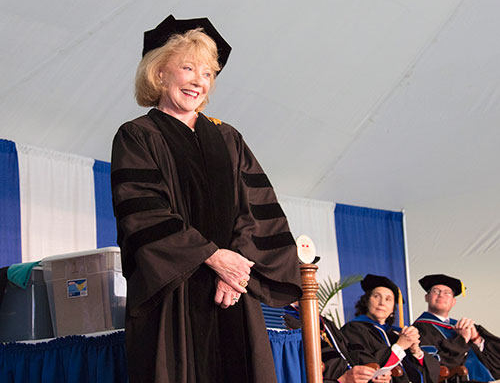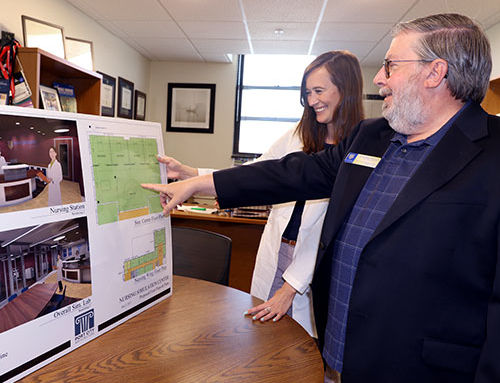Department Receives National Science Foundation Grant
By Patricia Erikson
Call them the SWAT team for the Sisters of Mercy’s Critical Concern for Earth. Over the past decade, science education at Saint Joseph’s College has undergone a sea change. Formerly split into the two departments of Biology and Natural Sciences and occupying outdated labs, more than a dozen faculty now work seamlessly as one Department of Sciences team in a shiny, renovated wing of Mercy Hall. On one hand, these scientists train the next generation of biologists, chemists, environmental scientists,marine scientists, and biochemists. On the other hand, they also nudge every student on campus into an understanding of the relationship between natural ecosystems and human lifeways by teaching the Core course Environmental Science 300: Ecology and the Environmental Challenge (ES300). They also serve the College’s large nursing program and the exercise science program by teaching the microbiology, chemistry, and anatomy and physiology requirements.
If this team has their way, Saint Joseph’s College graduates will be better equipped to devise solutions to the environmental problems we face as a society.
This past year, the trio of Steven Jury (Sciences), Johan Erikson (Sciences), and Marion Young (Psychology) teamed up with Liz Schran (Advancement) and applied for a National Science Foundation (NSF) grant to fund the Saint Joseph’s College Science Scholars Program. The result? A $647,000 S-STEM grant award–the only award of its kind in Maine this year and the largest in the state, to date. In granting the award, NSF noted the demonstrated ability of a tight-knit faculty team to deliver their proposed intervention into a national problem. What problem? The low national rate of persistence for high-achieving, low-income science students to graduate from science programs and pursue STEM careers.
When the grant application tallied the department’s track record of delivering innovative educational programming, the innovation was evident. The Sciences Department has been piloting project-based science education extensively over the past ten years–from aquaculture research in Casco Bay to water quality analyses of local drinking water supplies. In 2014, the department rolled out the Environmental Science Semester (ESS), a nationally rare opportunity for students to immerse themselves–full time, for a full semester, and entirely off campus–in honing their field science skills in oceanography, climate change, glacial geology and marine ecology.
Here enters an important factor in students’ educational success: the power of cohort. While scholarship funding helps science students enter college, research shows that funding alone is insufficient to get them through graduation and into a STEM career. These field programs are the crucible for building teams of student scientists. As one Environmental Science Semester student described it, “Working together in the field makes it easier to come out of your comfort zone. It makes it easier to work with each other. Everything goes a little more smoothly than if we didn’t know each other very well.”
Saint Joseph’s College’s nationally innovative field research programming will launch the Science Scholars into their field projects in August of 2018. Call it pre-season for scientists. Even before the armada of parents move the Class of 2022 into their dorm rooms, the Saint Joseph’s College Science Scholars will embark upon a research experience—as a team—that will shape the rest of their lives.
Photo caption: Faculty member Dr. Jim Paruk took his Ornithology class students Olivia Marable ’18 (left) and Danielle Martin ’19 to Falmouth, ME to assist with catching and banding birds at the Biodiversity Research Institute. Photo: Tyler Allen ’18.
The Saint Joseph's College Science Scholars Program is designed to encourage academically-talented students, who have demonstrated need of financial assistance, to enter into and succeed in a community of young scientists. Explore more at www.sjcme.edu/science.




